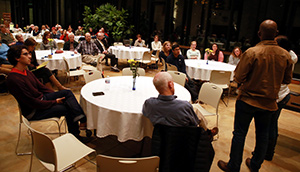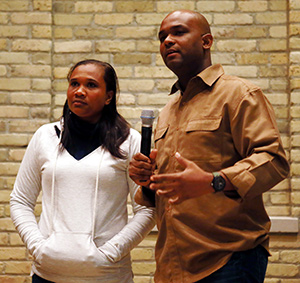In 2013, the Rana Plaza garment factory complex in Dhaka, Bangladesh collapsed, killing 1,133 and injuring 2,500.
 About 35 persons listened as Hanoi Sosa, with back to camera, a union organizer, and garment worker Elba Nurys, not pictured, speak about labor conditions in the Dominican Republic at the Cathedral of St. John the Evangelist, Sunday, Oct. 18.In response, a group of Catholic activists founded the Human Thread Campaign. The organization’s goal is to spread awareness of unjust practices within the garment industry and to empower Catholic consumers to take action in solidarity with garment workers.
About 35 persons listened as Hanoi Sosa, with back to camera, a union organizer, and garment worker Elba Nurys, not pictured, speak about labor conditions in the Dominican Republic at the Cathedral of St. John the Evangelist, Sunday, Oct. 18.In response, a group of Catholic activists founded the Human Thread Campaign. The organization’s goal is to spread awareness of unjust practices within the garment industry and to empower Catholic consumers to take action in solidarity with garment workers.
“The dignity of labor is often overlooked, and it’s very easy to be a consumer before being Catholic,” said campaign manager Jonathan Londoño. “It’s just such a strong responsibility that we have as both consumers and as people of faith to understand that everything that we do consume is coming from somewhere, and that everything is made by someone, and that someone deserves the dignity of the worker. Worker rights really are human rights, and the two aren’t to be separated.”
He became involved with trade activism as a student at Arizona State University, where he was responsible for bringing a chapter of United Students Against Sweatshops to campus. The role of campaign manager at the Human Thread Campaign allowed him to integrate that experience with his Catholic faith.
Londoño and other members of the Human Thread Campaign discussed their work and issues facing workers in Third
| For more information about the Human Thread Campaign, including information on local fair trade vendors and ways to research the trade and business practices of global brands, visit www.humanthreadcampaign.org. |
World countries in a presentation Sunday, Oct. 18, at the Cathedral of St. John the Evangelist, Milwaukee.
“To be able to share my experience with others and to be able to connect Catholics to the resources to bring about change in the garment industry is something that falls right in line with what I did and with my faith. To be able to connect those two was special to me,” he said.
Garment workers subject to mistreatment
People attending the presentation were greeted by a quote from Pope Francis, taken from a 2013 address to the International Federation of Catholic Medical Associations, prominently displayed at the entrance to the cathedral’s atrium.
“Things have a price and can be for sale, but people have a dignity that is priceless and worth far more than things,”  Hanoi Sosa, right, a union organizer, and Elba Nurys, a garment worker, speak about labor conditions in the Dominican Republic at the Cathedral of St. John, the Evangelist, Sunday, Oct. 18. Nurys, wearing a shirt made by Alta Gracia, a company that pays living wages, spoke in Spanish while Sosa translated. (Catholic Herald photos by Allen Fredrickson)the quote read.
Hanoi Sosa, right, a union organizer, and Elba Nurys, a garment worker, speak about labor conditions in the Dominican Republic at the Cathedral of St. John, the Evangelist, Sunday, Oct. 18. Nurys, wearing a shirt made by Alta Gracia, a company that pays living wages, spoke in Spanish while Sosa translated. (Catholic Herald photos by Allen Fredrickson)the quote read.
Frank Sherman, associate director of the Seventh Generation Interfaith Coalition for Responsible Investment and one of the founders of the Human Thread Campaign, introduced issues the organization seeks to combat by asking attendees to check the country of manufacture on their clothing tags. Responses included Bangladesh, Cambodia, Vietnam and the Philippines.
Sherman said that, of the clothing purchased in the United States, only 2 percent is manufactured here. Most of the remaining 98 percent is manufactured in developing countries, where mistreatment of garment workers is rampant.
Some of the most significant abuses prevalent in the industry include low wages, unpaid overtime, suppression of unions, unsafe working conditions, child labor and lack of benefits such as health insurance or pensions.
Two labor activists from the Dominican Republic, Hanoi Sosa, a union organizer, and Elba Nurys, a garment worker, also spoke.
Nurys, speaking in Spanish with Sosa as her translator, described her experience working in a garment factory. She said female workers were especially vulnerable to mistreatment, and were often the victims of sexual harassment or were fired when they became pregnant.
She also noted that the low wages and long hours – up to 16 hours a day – common in the garment industry did not allow workers to continue their education, essentially closing off the pursuit of opportunities that might improve their lives and those of their families.
Company offers living wages
Nurys and Sosa were part of the labor organization effort that led to the establishment of Alta Gracia, the only apparel company in the developing world to offer fair working conditions and living wages to its employees. An Alta Gracia employee receives 18,153 in Dominican pesos, the equivalent of about $497 monthly, which exceeds the legal minimum wage of 5,400 pesos or about $148 by nearly 340 percent, according to a 2014 report by John M. Kline and Edward Soule at Georgetown University.
Owned by Knights Apparel, a privately held South Carolina firm, it is located in a former apparel sweatshop that made baseball caps for Reebok and Nike until 2007.
Alta Gracia is cited by the Human Thread Campaign and other organizations as a model of how workers’ rights could be upheld within the garment industry without sacrificing profitability.
The company primarily manufactures and sells branded products to colleges and universities, but also sells bulk branded T-shirts and sweatshirts through distributor Ethix Merch.
“Alta Gracia is more than a model, more than a brand – it is a tool to create significant changes in this industry,” said Sosa.
At Alta Gracia, Nurys said, workers “are treated as human beings, which is not, unfortunately, common in the Dominican Republic.”
Sosa agreed, saying that Alta Gracia workers “are respected, have a voice in the work.”
“We want Alta Gracia to be expanded, to be replicated throughout the world,” Nurys said. “The impact in our community has been great and positive.”
Consumers can drive global change
Speaking to the Catholic Herald afterward, Sherman emphasized the responsibility of Catholics to be responsible consumers, and the importance of the consumer in driving global change.
“Everyone likes to point fingers, but we have the ultimate power with our pocketbooks,” he said. “As Catholic consumers, we have a responsibility toward Catholic social teaching, which respects worker rights.”
Sherman noted that it can be challenging for consumers to put a human face on what they purchase.
“Our globalized market separates us from the people who make our products, clothing or anything else,” he said. “The Human Thread’s objective is to raise awareness in Catholic communities … so that we can be in more solidarity with the workers that provide these garments.”
Londoño and Sherman spoke of the continuity of Catholic teaching on the rights of the worker, most recently articulated by Pope Benedict XVI and Pope Francis. The Human Thread Campaign brochure also cites Pope Leo XXII’s 1891 encyclical Rerum Novarum, which addressed the just treatment of workers and laid the groundwork for future development of Catholic social teaching.
The next goal for the Human Thread Campaign is to reach out to individual Catholic parishes, schools and universities, to encourage institutionalized commitment to ethical sourcing among Catholic organizations.
“Ethical sourcing is something that we can do, and is something that our faith calls for,” he said. “If Catholic institutions step up and say, ‘We want to be part of the demand for ethical sourcing and ethical labor,’ we can be part of that change. I think that’s such a powerful message … being able to be proactive for such a large problem at a local level.”
For Londoño, change starts with each individual consumer.
“Every time someone has an Alta Gracia shirt or a living wage product that they opted to buy in their closet, that’s a victory, that’s a small victory for the garment industry … that’s how it starts,” he said.
